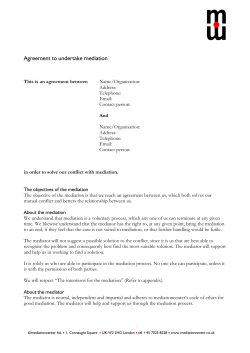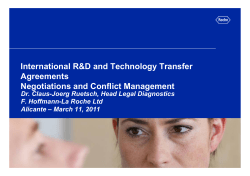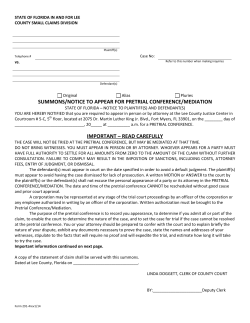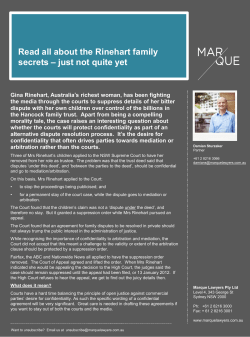
Oregon Mediation Association 28 Annual Fall Conference
Oregon Mediation Association th 28 Annual Fall Conference November 7-8, 2014 Ambridge Event Center 1333 NE MLK, Jr. Blvd. Portland, Oregon Register at: https://www.surveymonkey.com/s/2014OMAconf Register by October 24 for best rate! OMA is a nonprofit membership organization committed to the development, support, and advocacy of mediation in the state of Oregon. http://www.omediate.org ~ (503) 872-9775 ~ oma@omediate.org Keynote Speaker Conference Schedule Leonard L. Riskin, JD Friday, November 7, 2014 Leonard is the Chesterfield Smith Professor of Law at the University of Florida, College of Law. He teaches and writes about mediation, negotiation, and alternative dispute resolution. He has led projects to integrate dispute resolution into standard law school classes and incorporate mindfulness into the education of lawyers and other dispute resolution professionals. He is the author of the 2013 Harvard Negotiation Law Review article: “Managing Inner and Outer Conflict: Managing Selves, Superpersonalities, and Internal Family Systems.” 7:30 – 3:30 8:30 – 10:30 10:45 – 12:15 12:15 – 1:30 1:45 – 3:15 3:30 – 5:00 5:00 – 7:00 Registration Breakfast & Keynote Address 1 Workshop Session #1 Lunch & Awards of Excellence Workshop Session #2 Workshop Session #3 Reception & Silent Auction Saturday, November 8, 2014 7:30 – 2:30 8:00 – 9:15 9:30 – 11:00 11:00 – 12:30 12:45 – 2:15 2:30 – 4:00 4:00 – 5:00 Registration Breakfast & Membership Meeting Workshop Session #4 Lunch & Keynote Address 2 Workshop Session #5 Workshop Session #6 Closing Session nformation General Information Conference Website http://www.omediate.org/pg1147.cfm Opening & Closing Sessions Presenter Denise Gour, LCSW Denise is the principal of Mindful Place, based in Portland. She is a licensed clinical social worker with over 15 years’ experience, specializing in stress reduction, effective management of depression, anxiety, and addiction recovery. She is trained to teach the Mindfulness Based Stress Reduction program, developed by Jon Kabat-Zinn. Her practice integrates conventional talk/cognitive therapy with art, meditation, and gentle movement. Her goal is to help people discover their own personal sense of a balanced lifestyle and develop skills that support a sense of well-being in relationships, work, and life. Conference Location Ambridge Event Center 1333 NE Martin Luther King, Jr. Blvd. Portland, OR 97232 Workshop Materials The web address to access online workshop materials will be made available at the Conference. Conference Buddies Is this your first OMA conference? Are you a conference veteran who’d like to show a new attendee the ropes? If so, sign up as a Buddy on your registration and we’ll match you up! Continuing Education Credits OMA is applying for continuing education credits with Oregon State Bar (OSB), National Association of Social Workers (NASW), and Human Resources Certification Institute (HRCI). Available certificates will be provided by request at the Conference. Important Dates 10/17: Volunteer Applications Due 10/24: Early Registration Rate Deadline Workshop Session #1 Friday, Nov. 7 ~ 10:45 – 12:15 Workshop Session #2 Friday, Nov. 7 ~ 1:45 – 3:15 1A: Mediating with Multiple Generations (B) Understand and assist the five generations currently in existence and having to interact with each other. Consider and discuss workplace and family dispute case studies through a generational lens. Donna Lurie, Lurie Workplace Solutions 2A: The Art of Cross-Cultural Dispute Resolution (IC) The presentation will examine how the obvious and notso-obvious cultural difference impacts resolution of interpersonal and inter-state (international) disputes. Specifically, the presentation will bring an international perspective to understanding the impact of culture in the most commonly used international and domestic dispute resolution practices (negotiation and mediation.) Sukhsimranjit Singh, LLM, Associate Director, CDR 1B: A Path to Healing: Mediating Adverse Medical Events (B) Mindful conversations that take place between patient and caregiver following an adverse healthcare incident can speed the path to healing for everyone involved. This workshop will provide detailed information about a new law in Oregon that created Early Discussion and Resolution (EDR), a voluntary process for resolution of incidents resulting in death or serious physical injury to patients. Donna Silverberg, DS Consulting / Randall Jenkins, JD, University of Florida / Shannon Alexander, RN, MBA, CHPRM, Providence St. Vincent Medical Center / Pam Aneshansely Hren, Providence Portland Medical Center / Melissa Parkerton, MA, Ore. Patient Safety Commission 1C: The Mindful Mediator: Becoming What is Missing (PS) Exploration of how the mediator’s application of specific mindfulness practices may subtly but positively influence the contour – the energetic boundaries – of a mediation session and cultivate a sense of spaciousness and resourcefulness that may otherwise be missing Christine Trani, MA (Psychology) 1D: Collaborative Mediation: The Intel Story (B) HR professionals know how successful mediation is for resolving EEOC charges and lawsuits. But, what about pure workplace conflict? Can formal mediation be used to resolve challenging interpersonal issues between coworkers and managers? Intel has embarked on a pilot program to determine how mediation might help in the world of high technology Patrick Lau & Jodi Maslowski, HR Business Partners, Intel 1E: Decision-making, Communication & Mindfulness (P/S) Using mindfulness principles enhances participant decision-making and communication during mediation, enabling participants to more effectively clarify their needs and interests, while understanding the perspective of others. Nancy Neal Yeend 1F: Silk Road: Eastern Spiritual Practices and Western Mediation (T) In this advanced mediation training, we will explore principles and practices drawn from the ancient religious traditions of Buddhism, Sikhism and Hinduism that are universal in nature and can help contemporary Western mediators resolve conflict more skillfully. Michael Dwyer, JD, Dwyer Mediation Center / Sukhsimranjit Singh, LLM, Associate Director, CDR 2B: Workplace Mediator? Why Should I Hire You? (B, P/S) Every successful business learns early to listen to clients. Here's your chance to literally do this. These panelists have brought practitioners like us into their organizations. Wouldn't you be hungry to know what prompted them to pay for our services? How did they select the right mediator? Chris Sheesley, President, In Accord 2C: Mindful Policing (C) Overview of mindfulness in the context of the American Police Institution - how mindfulness can be introduced and integrated into police culture and organizational leadership to enhance human and organizational outcomes. Richard Goerling, MBA, Lieutenant, Hillsboro Police 2D: Overcoming Resistance to Change (P/S) An interactive workshop that explores the reasons why people resist change in mediation, even if the change looks to be substantially in their favor. We'll explore the concepts of risk and uncertainty and how a mediator might help people get to advantageous outcomes involving some degree of risk. Steve Greenwood, Deputy Director, National Policy Consensus Center 2E: How Mindfulness and Loving-Kindness Practice Supports Mediator Presence (P/S) Transforming conflict depends on the ability to be with discomfort, resisting the natural urge to “seek pleasure and avoid pain.” Maintaining a compassionate presence to be with strong emotions and intense interactions requires clarity, steadiness, and warmth. This workshop will focus on ways to cultivate those qualities through loving-kindness and mindfulness practices. Mary Zinkin, PhD, Assistant Professor, Buddhist Chaplain 2F: Mediation is Risky (T) Three theories (Self-Determination, Transaction Resource, and Collective Choice) reveal how professional organizations can resolve mediation's three paradoxes (psychological dissatisfaction, extra cost and mediator manipulation) by passing mandatory ethical standards. Sam Imperati, JD, E.D., Institute for Conflict Management Business (B) ~ Community (C) ~ Intercultural (I/C) ~ Practical Skills (P/S) ~ Theory (T) Workshop Session #3 Friday, Nov. 7 ~ 3:30 – 5:00 3A: Mediation with/for Latinos (I/C) Exploring the variety of cultural components and considerations when providing mediation services for Spanish-speaking Latinos and their/our families and neighbors. Sandy Bacharach and Pete Johnson 3B: Conflict Coaching at OHSU: Supporting SelfDetermined Solutions to Workplace Conflict (B) This workshop will expose participants to OHSU's innovative internal Conflict Coaching Program, an employee resource that was launched in 2012 and is getting excellent results. Mary Lind, MS, MA 3C: Beaverton Second Home: Partnership, Expansion, and Lessons Learned (C) This workshop presents the Second Home program model, which utilizes mediators and facilitated discussions to strengthen the relationships between homeless high school students and volunteer home providers. Beaverton Second Home is a collaborative effort between Ecumenical Ministries of Oregon, Beaverton School District, and the Beaverton Dispute Resolution Center. Carley Berkey, MA (Conflict Res.) / Jennifer Pratt, MDiv 3D: CDR over ADR: Creative Dispute Resolution (P/S) This workshop explores creativity skills and associated techniques for generating new solutions to old (and continuing) conflicts. Research in this area suggests that "tilting" the mediation (or other conflict resolution process) towards this approach produces more valuable results and increases the appreciation of the role of the neutral. Jack Russo, Esq., JD, MBA, LLM 3E: Empathy: a Catalyst that Enhances Understanding (T) This workshop will cover the definitions of empathy, the development of empathy within ourselves and the effects of empathy on the mediation process. Charlie Young 3F: MI: Using Resistance to Create Change (P/S) Motivational Interviewing is a dialogue style that engages resistance as a motivator toward desired change. We will practice “rolling with resistance,” then learn to “develop discrepancy,” mindfully exploring the discomfort of internal conflict to find an “internal resolution” that removes barriers to progress. Katherine Anne Stansbury, BA, CADCI Workshop Session #4 Saturday, Nov. 8 ~ 9:30 – 11:00 4A: Taking Interest and Finding Value in Culture (I/C) We interpret others’ choices from their past behavior— and our own backgrounds. In this highly-interactive workshop, we’ll explore values and interests manifested from cultures and experiences of clients, colleagues, and ourselves. Kevin A. Grant, Neighbor to Neighbor Mediation 4B: Everyday Mindfulness for the Workplace and Beyond (P/S) This is an interactive, skill-building workshop that introduces several user-friendly strategies for integrating secular mindfulness into everyday life at work and beyond. Assorted practices offer variations in time length and techniques making them suitable to individual situations and needs. Denise Gour, LCSW, Therapist/Mindfulness Educator 4C: Mindful Engagement with Children and Youth (C) This workshop will explore collective narratives about conflict, and how they impact the strategies we choose to employ when we experience conflict with the children and youth in our lives. Theresa Logan, MS (Conflict Analysis and Resolution) 4D: Cultivating Fierce Compassion for Mediators (T) Over the years Len Riskin has been a pioneer in teaching us the positive impact that mindfulness can have for mediators and professionals in conflict resolution. With mindfulness we are able to develop positive attributes and “mediator presence” to resolve conflict. Michael Dwyer, JD, Dwyer Mediation Center 4E: Mediating High-Emotion Cases (B, P/S) A fast-paced and entertaining presentation on the neurology of conflict, the impact a mindful and compassionate mediator can have, and tips and tricks for talking parties off the ledge. Scott Bellows, JD 4F: A Taste of Mindfulness-Based Stress Reduction (P/S) Mindfulness-Based Stress Reduction (MBSR) is the epicenter of the current wave of mindful interventions. Researched for 30+ years, MBSR provides direct experience of the power of mindfulness. Sample a few practices, and learn how you might start or continue your own practice. Laura Martin, LCSW Business (B) ~ Community (C) ~ Intercultural (I/C) ~ Practical Skills (P/S) ~ Theory (T) Workshop Session #5 Saturday, Nov. 8 ~ 12:45 – 2:15 5A: Vacant 5B: The Mindful Approach to Workplace Mediation (B) Studies show us that mindful leadership increases employee job satisfaction, employee performance and decreases workplace conflict. This workshop will explore the mindful leader's approach to mediating workplace conflict and improving overall awareness and connection in the workplace. Jill Goldsmith, JD / Judy Clarke, MEd, Counseling 5C: Practical Skills-Based Deliberative Democracy in Action: The Jackson County GMO Crops Citizen Initiative Review (C) 5 years on, Oregon has institutionalized the “Citizen Initiative Review”, a process through which citizens learn and deliberate about an initiative and produce a citizen statement to help inform voters with credible, unbiased information through the Voters Pamphlet. Participants will explore how mindfulness applied to deliberative democracy can make for more sound societal decisions. Robin Gumpert, Senior Associate, DS Consulting 5D: The Roadmap to Mindful Resolution (P/S) In this workshop we explore how to move into a new consciousness that allows us to face conflict with clarity, creativity, and confidence. Participants will learn how to use insights from neuroscience and practices of mindfulness to create this internal state shift where conflict transforms from obstacle into opportunity. Rangineh Azimzadeh Tosang, MA (International Conflict Resolution) and Principal & Founder, Solh Resolutions International and Brynn Wallace, MSW, LMSW (NY), Certified Somatic Experiencing Practitioner 5E: Mindful Mediation: A Vision for the Future (T) Where have we come from, where are we now, and where are we going as a field? Bring your questions, your hopes and your dreams to this interactive conversation as we create our vision for the future. Larry Coady, Lauren MacNeill, and Cynthia Moore, OMA Standards & Practices Committee 5F: Transformative Mediation: Tools of Engaging Parties in Powerful Dialogue (P/S) This model of mediation is based on the premise that despite conflict’s potentially destructive impacts on interaction, people have the capacity to change the quality of their interactions to reflect relative openness and responsiveness. These positive dynamics feed into each other so the interaction can regenerate and assume a constructive, connecting, and humanizing character. Tsipora Dimant Workshop Session #6 Saturday, Nov. 8 ~ 2:30 – 4:00 6A: The Influence of Mindfulness on Microaggressions (I/C) This workshop teaches techniques for improving cultural competency by focusing one's awareness on the present moment, while calmly acknowledging and accepting one's feelings, thoughts, and bodily sensations about common exposure to racism in America. Ronee Pillsbury-Hunter 6B: Listening to Self-Talk: Noticing our Biases (I/C) Third-party neutral implies an ability to objectively interpret biased information. This workshop challenges this concept, and proposes one can better reflect the qualities of impartiality by focusing on one’s own biases. Marc D. Steiner, MA (Communication) 6C: The Confluence of Collaboration and Advocacy in ECR (B, C) This panel brings together five practitioners and advocates to discuss the relationship between advocacy and collaboration in environmental conflict resolution. Focusing on environmental conflict resolution, the panel will be an opportunity for attendees/participants to consider how best to address contentious issues over which there is often disagreement; to consider new perspectives on and new frames for how we engage across differences; and how we go about achieving goals in the face of initial or apparent disagreement. Gordon Levitt, JD / Steve Greenwood, Deputy Director, National Policy Consensus / Tim Hicks, Fmr. Director, UO Conflict and Dispute Resolution Program / Allison Hensey, Agriculture and Watersheds Program Director, Oregon Environmental Council (OEC) / Turner Odell, Natural Resources Program Manager, Oregon Consensus 6D: Game Playing in Negotiation and Mediation: Machiavelli's Place at the Table (P/S) Game-playing, despite being derided by many present day practitioners and theorists as disingenuous, irrational, “Machiavellian,” and unethical behavior, is a natural and necessary part of most human interactions--- especially in the negotiation of difficult issues where people characteristically feel vulnerable and at risk. Thoughtfully used, game-playing strategies and tactics can offer a constructive and creative approach to managing such matters. Robert D. Benjamin, JD, MSW 6E: Practicing the Act of Listening and the Art of Hearing (P/S) Improve your effectiveness as a coach, mediator, and facilitator by helping clients get what they need most to be successful—the experience of truly being heard. In this workshop, attendees will learn and practice techniques they can use on their own to help strengthen their ability to quickly engage in listening, and to stay actively listening and empathically hearing. Wendy Kincade, MS (Conflict and Dispute Resolution) 6F: Breakthrough with Buddhism: Mindful Resolution through Buddhist Teachings (P/S) The word Buddhi means ‘to wake up’, and as conflict engagement practitioners we often find ourselves witnessing participants ‘waking up’ as a result of engaging in a conflict resolution or restorative justice process. In this engaging workshop blending philosophy with practical tools, we will explore how Buddhist teachings can correspond with, inspire, and enrich our work. Caitlan Hendrickson, Director, UO Conflict Resolution Svcs. Business (B) ~ Community (C) ~ Intercultural (I/C) ~ Practical Skills (P/S) ~ Theory (T) Registration Rates Early Rates (through 10/24) OMA Individual Member Status OMA Member: Paid Practitioner or Friend of Mediation OMA Member: Unpaid Practitioner or Full-Time Student Not an OMA Member** OMA Member: Conference Volunteer*** Workshop Lead Presenter Workshop Co-Presenter Days Attending Regular Rates (after 10/24) Individual Rate OMA Organizational MemberAffiliated Rate* Individual Rate OMA Organizational MemberAffiliated Rate* 2 $280 $250 $310 $280 1 $160 $145 $180 $160 2 $160 $145 $180 $160 1 $90 $80 $100 $90 2 $350 $315 $390 $350 1 $200 $180 $220 $200 2 $115 (register by 10/17) 1 $65 (register by 10/17) 2 Complementary 1 Complementary 2 $115 1 $65 Notes * To receive the OMA Organizational Member-Affiliated Rate, you must be affiliated with an organization that has a current organizational membership with OMA. Eligible organizations will be listed on the online registration form. **If you’re Not an OMA Member, consider signing up today! In addition to receiving discounted registration rates at the Fall Conference and other OMA trainings, you’ll remain up to date on all things mediation in the state and help us all support, develop, and advocate for mediation in Oregon. You may sign up as part of the online registration. ***To apply as a Conference Volunteer and receive the discounted rate, you must be (or become) an OMA Member and apply on the online registration form by October 17. For more information, see: http://www.omediate.org/pg1166.cfm. Additional Registration Information Register Online at: https://www.surveymonkey.com/s/2014OMAconf Payment: We accept PayPal, checks, credit cards, government payment vouchers, and purchase orders for advance registrations. If your organization or agency requires confirmation of registrations, please email oma@omediate.org or call (503) 872-9775. Cancellation & Refund Policy: Cancellations on or before October 24 will receive a 50% refund. Cancellations after October 24 will receive no refund. Scholarships and Donations: A limited number of scholarships may be available to those unable to attend the conference otherwise. Please inquire by emailing oma@omediate.org or calling (503) 872-9775. Conference Scholarships are made available through the generous contribution of our members and supporters. To make a donation to the scholarship fund, and help pay the way for those in need, please visit http://www.omediate.org, click Make a Payment, and select Shannon Stewart Mediation Training Fund. Travel and Lodging Information Hotels Mention “OMA Conference” when booking at these hotels to receive a special rate (limited availability): Marriott Courtyard Downtown/Convention Center 435 NE Wasco St, Portland, OR (503) 234-3200 Inn at the Convention Center 420 NE Holladay St, Portland, OR (503) 233-6331 Parking For conference parking information, please visit: http://www.ambridgeevents.com/services/parking/ Homestays If you’re interested in offering your home to out-oftown guests or would like to inquire about staying with a fellow conference-goer, please email oma@omediate.org or call (503) 872-9775. Transportation Mass Transit: The Ambridge Event Center is within three blocks of a TriMet MAX station and bus stops. For more information, visit http://trimet.org. Carpooling: If you’re interested in carpooling with others, register at http://drivelessconnect.com and look for “OMA Fall Conference 2014” under Events. The staff and volunteers of the Oregon Mediation Association 28th Annual Fall Conference sincerely thank you for your participation and support. We wish you a wonderful conference and look forward to seeing you soon!
© Copyright 2025











